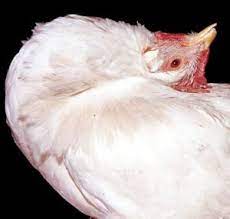Newcastle disease (ND) is highly infectious. The disease usually occurs in chickens but can affect
all other species of poultry. Transmission is through oral and respiratory discharge and feces
of infected birds. By law, this disease must be reported at once.
Etiology of Newcastle disease (ND)
The disease is caused by Paramyxovirus, a virus that is heat sensitive.
Sign and symptoms
• Respiratory distress and nervous disorder
• Transient coughing, sneezing, and rales
• Marked depression and prostration (laying down) in young chicken with abnormal positioning
of the head (‘star gazing’)
• Dyspnea (short of breath), violent green diarrhea, conjunctivitis, and paralysis
• Death usually occurs within 3 days and mortality can be high as 100%
Health Considerations continued

TREATMENT of Newcastle disease (ND)
There is no known treatment for ND which makes prevention very necessary.
PREVENTION
• Vaccination (live or inactive vaccine) of the day-old chicks is the only reliable method of control
• Proper sanitation and hygiene
-
No medication has been shown to impact the course of virulent Newcastle disease virus infection, and treatment with antivirals is not recommended. In cases of flocks affected by loNDV, supportive care with antimicrobials against secondary infections may alleviate clinical signs and decrease morbidity and mortality. Prevention of Newcastle disease is achieved through biosecurity and vaccination.
Biosecurity
Practicing strict biosecurity and implementing strategies to prevent introduction (or transmission) of vNDV into poultry premises are efficient preventive and intervention measures. Routine disinfection procedures, feed and water quality, and pest and litter management should be properly controlled.
Many countries practice outbreak containment by culling infected and susceptible birds in a controlled zone to prevent further transmission of disease. Respective authorities should be immediately notified in case of a suspected vNDV infection. Regulations on the importation of live birds and poultry products, especially from endemic regions, facilitate the control of international transmission of vNDV.
Vaccination
Vaccines are available for chickens, turkeys, and pigeons and are used to induce an antibody response; therefore, vaccinated birds must be exposed to a larger dose of vNDV to be infected. Unfortunately, ND vaccines do not provide sterile immunity, and in many areas of the world, vaccines are used to prevent losses from sickness and death.
While there is an increasing number of reports of Newcastle disease outbreaks in vaccinated poultry, approved vaccines prevent clinical signs of disease under experimental conditions. Passively transferred maternal antibodies and antibodies from previous immunizations impact vaccination against NDV, and vaccination protocols with multiple deliveries (boosters) need to be carefully and properly designed. Field and environmental conditions, as well as concurrent infections, may also negatively impact immune response to vaccination.
Live Virus Vaccines
Live lentogenic virus vaccines, chiefly B1 and LaSota strains, are widely used and typically administered to poultry by mass application in drinking water or by spray. Mucosal immunity induced in birds vaccinated by live virus vaccines applied by these routes decreases the amount of vNDV the vaccinated birds will shed if infected with vNDV, compared with the immune response induced by an inactivated virus vaccine.
Mass vaccination methods are less labor intensive; however, if they are not applied properly, they may lead to < 85% of the flock being immunized, the threshold needed for herd immunity. Alternatively, individual administration of live virus vaccines is via the nares or conjunctival sac. Healthy chicks are vaccinated as early as day 1 of life. However, delaying vaccination until the second or third week avoids maternal antibody interference with an active immune response.
Inactivated Virus Vaccines
Oil-adjuvanted inactivated virus vaccines are also used after live virus vaccine in breeders and layers. They may be used alone in situations where live virus may be contraindicated (eg, in pigeons). In countries where vNDV is endemic, a combination of live and inactivated virus vaccine can be used; alternatively, if permitted by law, a live mesogenic strain virus vaccine may be used in older birds.
The frequency of revaccination to protect chickens throughout life largely depends on the risk of exposure and virulence of the field virus challenge. Administering inactivated virus vaccines is more labor intensive, because each bird has to be handled individually. Accidental inoculation of human tissues with oil-based vaccines requires prompt medical treatment.
Vectored Recombinant Vaccines
Fowl pox or turkey herpesvirus–vectored NDV vaccines are commercially available for chickens and have the advantage of being able to be administered in ovo at the hatchery. These vaccines must be reconstituted as directed by the manufacturer. Because they take 3–4 weeks to produce a protective level of immunity, a window of exposure occurs during which chickens are susceptible to vNDV infection and biosecurity becomes even more important.
- Click Here for details


Very informative thanks sir